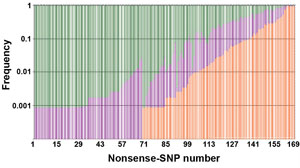The nonsense in our genes
One in 200 of our human genes can be inactivated with no detectable effect on our health. A study by Wellcome Trust Sanger Institute scientists raises new questions about the effects of gene loss on our wellbeing and evolution.

The study, published today in The American Journal of Human Genetics, explores single letter changes in our genetic code that affect the ability of genes to produce proteins. The researchers’ findings suggest that such mutations, while sometimes harmful, generally have little consequence for the individual and may occasionally even be beneficial in evolutionary terms.
The team studied variations in the genetic code of more than 1000 people from around the world. They focused their work on single-letter changes (called SNPs) that disrupt proteins, leading to versions that are either shorter or completely absent. One might intuitively expect that such a change – called a nonsense-SNP – would be harmful to the person.
“We knew that these mutations existed and that many have been associated with genetic diseases, but we were amazed to find that they were so common in the general population. We found that 167 genes could be inactivated by nonsense mutations, and that individuals carry on average at least 46 such variations. For 99 of the genes, both copies could be lost in adults living a normal existence.”
Bryndis Yngvadottir Lead author on the study, from the Wellcome Trust Sanger Institute
Human DNA contains approximately 20,000 genes: the total of 99 genes with nonsense-SNPs means that at least one in 200 genes is dispensable. Some harmful nonsense-SNPs were also present among the 167 genes studied: eight are listed in the Human Gene Mutation Database which catalogues disease-causing mutations.
While the researchers found that inactivating genes was, on the whole, slightly harmful, there were exceptions. In East Asia, but not in other places, it seems to have been advantageous to lose the MAGEE2 gene.
“There is a theory that ‘less is more’ where genes are concerned and we already knew of a couple of examples of advantageous gene loss. But this is the first large-scale investigation of its significance for recent human evolution.
“The MAGEE2 gene is an interesting new example, although we have absolutely no idea what this gene does, or why some people are better off without it. However, our study suggests that overall, gene loss has not been a major evolutionary force: our genome does not seem to be in a hurry to get rid of these ‘superfluous’ genes.”
Chris Tyler-Smith Coordinator the study, from the Wellcome Trust Sanger Institute
“Certain types of genes tend to be lost preferentially. We found the biggest decrease in the genes that contribute to our sense of smell. Perhaps early humans didn’t like smelly partners, and so when humans started to live together in big groups it helped their chances of finding true love if they couldn’t smell their partner too strongly.”
Bryndis Yngvadottir Sanger Institute
Genetic variation in nonsense-SNP numbers was significant: participants in the survey had between 29 and 65 of these mutations each and varied on average by 24 genes as a consequence. Eighteen of the 169 nonsense-SNPs investigated are also present in the Craig Venter genome published last year.
More information
Funding
This work was funded by the Wellcome Trust.
Publications:
Selected websites
The Wellcome Trust Sanger Institute
The Wellcome Trust Sanger Institute, which receives the majority of its funding from the Wellcome Trust, was founded in 1992. The Institute is responsible for the completion of the sequence of approximately one-third of the human genome as well as genomes of model organisms and more than 90 pathogen genomes. In October 2006, new funding was awarded by the Wellcome Trust to exploit the wealth of genome data now available to answer important questions about health and disease.
The Wellcome Trust
The Wellcome Trust is a global charitable foundation dedicated to achieving extraordinary improvements in human and animal health. We support the brightest minds in biomedical research and the medical humanities. Our breadth of support includes public engagement, education and the application of research to improve health. We are independent of both political and commercial interests.


